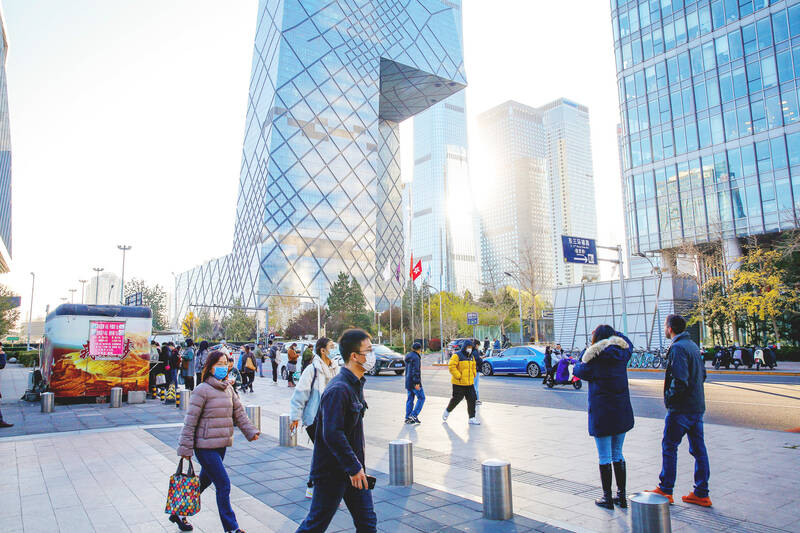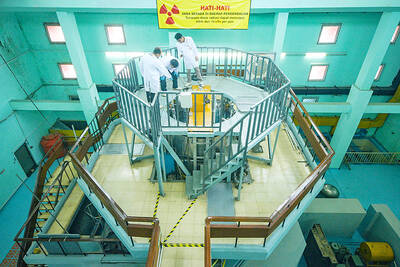China’s COVID-19 cases rose further yesterday, including in the capital, Beijing, even as many cities scaled back routine testing after authorities last week announced measures aimed at easing the impact of the country’s heavy coronavirus curbs.
China is scrambling to limit the damage of its “zero COVID-19” policy nearly three years into the pandemic, as the latest in a spate of dismal economic reports showed retail sales fell last month and factory output grew more slowly than expected.
While many residents have expressed guarded optimism after Friday’s announcement that some of the stringent COVID-19 policies would be eased, concerns grew this week over the worsening outbreaks and there was confusion as some cities halted or adjusted regular testing.

Photo: EPA-EFE
In Guangzhou, a southern city of nearly 19 million people, new infections crossed 5,000 for the first time, fueling speculation that district-level lockdowns could expand.
“The infection curve of Guangzhou is tracking the pace of Shanghai’s March-April outbreak, raising the question of whether a city-wide lockdown will be triggered,” JPMorgan analysts wrote, referring to Shanghai’s two-month lockdown this year.
“It would become a testing point regarding the government’s determination to push for the relaxation of COVID control measures,” they said.
China reported 17,772 new local COVID-19 infections for Monday, up from 16,072 new cases a day earlier and the most since April, with major cities, including Chongqing and Zhengzhou, among the worst-hit.
JPMorgan estimates that cities with more than 10 new cumulative cases in the past week are home to 780 million people and account for 62.2 percent of GDP — roughly triple the levels seen at the end of September.
On Monday, Beijing’s most populous district of Chaoyang, where most of its cases are located, moved some testing sites closer to residential compounds.
While that increased the overall number of sites, it also led to long waiting times in many cases, fueling frustration, as many workplaces and other venues still require negative test results from within 24 hours.
ONLINE CRITICISM
On Sina Weibo, a hashtag on testing booth closures was flooded with critical comments on Monday night before being censored: “What are working people supposed to do?” wrote one Weibo user. Another asked: “What kind of brain came up with this policy?”
Yesterday, state broadcaster CCTV said Chaoyang district was adding more testing sites, including near office buildings.
Beijing reported 462 new infections for Monday, up from 407 a day earlier.
Under China’s new rules, testing efforts are to be more targeted, easing what has been a significant financial burden on cities.
Friday’s easing announcement sparked a rally in stocks on hopes that China is signaling plans to end a policy that has all but shut its borders and caused frequent lockdowns, possibly starting after the annual session of parliament in March next year.
However, experts have said that full reopening would require a massive vaccination booster effort, given low levels of herd immunity resulting from China’s isolation during the pandemic.
It would also require a change in messaging, they said, in a country where catching COVID-19 is widely feared.

Four people jailed in the landmark Hong Kong national security trial of "47 democrats" accused of conspiracy to commit subversion were freed today after more than four years behind bars, the second group to be released in a month. Among those freed was long-time political and LGBTQ activist Jimmy Sham (岑子杰), who also led one of Hong Kong’s largest pro-democracy groups, the Civil Human Rights Front, which disbanded in 2021. "Let me spend some time with my family," Sham said after arriving at his home in the Kowloon district of Jordan. "I don’t know how to plan ahead because, to me, it feels

Poland is set to hold a presidential runoff election today between two candidates offering starkly different visions for the country’s future. The winner would succeed Polish President Andrzej Duda, a conservative who is finishing his second and final term. The outcome would determine whether Poland embraces a nationalist populist trajectory or pivots more fully toward liberal, pro-European policies. An exit poll by Ipsos would be released when polls close today at 9pm local time, with a margin of error of plus or minus 2 percentage points. Final results are expected tomorrow. Whoever wins can be expected to either help or hinder the

North Korea has detained another official over last week’s failed launch of a warship, which damaged the naval destroyer, state media reported yesterday. Pyongyang announced “a serious accident” at Wednesday last week’s launch ceremony, which crushed sections of the bottom of the new destroyer. North Korean leader Kim Jong-un called the mishap a “criminal act caused by absolute carelessness.” Ri Hyong-son, vice department director of the Munitions Industry Department of the Party Central Committee, was summoned and detained on Sunday, the Korean Central News Agency (KCNA) reported. He was “greatly responsible for the occurrence of the serious accident,” it said. Ri is the fourth person

SKEPTICAL: Given the challenges, which include waste disposal and potential domestic opposition, experts warn that the 2032 nuclear timeline is overambitious Indonesia is hoping going nuclear can help it meet soaring energy demand while taming emissions, but faces serious challenges to its goal of a first small modular reactor by 2032. Its first experiment with nuclear energy dates to February 1965, when then-Indonesian president Sukarno inaugurated a test reactor. Sixty years later, Southeast Asia’s largest economy has three research reactors, but no nuclear power plants for electricity. Abundant reserves of polluting coal have so far met the enormous archipelago’s energy needs, but “nuclear will be necessary to constrain the rise of and eventually reduce emissions,” said Philip Andrews-Speed, a senior research fellow at the